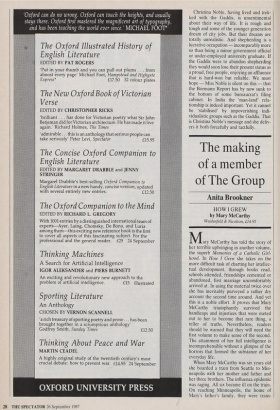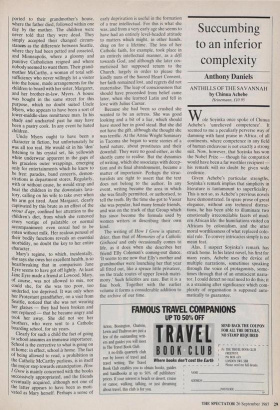The making of a member of The Group
Anita Brookner
HOW I GREW by Mary McCarthy Weidenfeld & Nicolson, £14.95 Mary McCarthy has told the story of her terrible upbringing in another volume, the superb Memories of a Catholic Girl- hood. In How I Grew she takes on the more difficult task of charting her intellec- tual development, through books read, schools attended, friendships cemented or abandoned, first marriage uncomfortably arrived at. In using the material twice over she has inevitably purveyed a rather dry account the second time around. And yet this is a noble effort. It proves that Mary McCarthy triumphantly survived the handicaps and injustices that were meted out to her to become that rare thing, a teller of truths. Nevertheless, readers should be warned that they will need the first volume to make sense of the second. The attainment of her full intelligence is incomprehensible without a glimpse of the horrors that formed the substance of her everyday life.
When Mary McCarthy was six years old she boarded a train from Seattle to Min- neapolis with her mother and father and her three brothers. The influenza epidemic was raging. All six became ill on the train. On reaching Minneapolis, the home of Mary's father's family, they were trans- ported to their grandmother's house, where the father died, followed within one day by the mother. The children were never told that they were dead. They simply accepted their changed circum- stances as the differende between Seattle, where they had been petted and cosseted, and Minneapolis, where a gloomy and punitive Catholicism reigned and where nobody seemed to want them. Their grand- mother McCarthy, a woman of total self- sufficiency who never willingly let a visitor into the house, made arrangements for the children to board with her sister, Margaret, and her brother-in-law, Myers. A house was bought in the same street for this purpose, which no doubt suited Uncle Myers, who appears to have been a sort of lower-middle-class remittance man. In his shady and uncharted past he may have been a pastry cook. In any event he hated children.
Uncle Myers ought to have been a character in fiction, but unfortunately he was all too real. He would sit in his 'den' listening to his crystal set, his yellowish white underwear apparent in the gaps of his graceless outer wrappings, emerging only for entertainments which he knew to be free: parades, band concerts, demon- strations in department stores. Regularly, with or without cause, he would strap and beat the children in the downstairs lava- tory, calling on his wife to take over when his arm got tired. Aunt Margaret, clearly captivated by this brute as an effect of the retour (rage, confined her attention to the children's diet, from which she removed every vestige of palatable or normal accompaniment: even cereal had to be eaten without milk. Her zealous perusal of their bodily functions reveals an essential morbidity, no doubt the key to her entire character.
Mary's regime, to which, incidentally, she says she owes her excellent health, is so heartbreaking that in comparison Jane Eyre seems to have got off lightly. At least Jane Eyre made a friend at Lowood. Mary, of course, was not allowed to mix, nor Could she, for she was too poor, too underfed, too deprived. It was only when her Protestant grandfather, on a visit from Seattle, noticed that she was not wearing her glasses — they had been broken and not replaced — that he became angry and took her away. She did not see her brothers, who were sent to a Catholic boarding school, for six years. Clearly for such a child the fact of going to school assumes an immense importance. School is the corrective to what is going on at home: in effect, school is home. The fact of being allowed to read, a prohibition in the Catholic McCarthy purlieus, is in itself the major step towards emancipation. How I Grew is mainly concerned with the books successively appropriated, and the friends eventually acquired, although not one of the latter appears to have been as moti- vated as Mary herself. Perhaps a sense of early deprivation is useful in the formation of a true intellectual. For this is what she was, and from a very early age she seems to have had an entirely level-headed attitude to matters which might, in other hands, drag on for a lifetime. The loss of her Catholic faith, for example, took place in an entirely intellectual manner, as a defi towards God, and although she later cos- meticised her supposed return to the Church, largely in order to please the kindly nuns of the Sacred Heart Convent, her faith remained lost, and regrets did not materialise. The leap of consciousness that should have proceeded from belief came later, when she learned Latin and fell in love with Julius Caesar.
Because she had been so crushed she wanted to be an actress. She was good looking and a bit of a liar, which should have stood her in good stead. But she did not have the gift, although she thought she was terrific. At the Annie Wright Seminary in Tacoma she began to write stories of a lurid nature, about prostitutes and their downfall. They were no good either, as she shortly came to realise. But the dynamics of writing, which she associates with decep- tion and its final abandonment, became a matter of importance. Perhaps the struc- turalists are right to assert that the text does not belong to the author. In any event, writing became the area in which she was finally permitted, or authorised, to tell the truth. By the time she got to Vassar she was popular, had many female friends, and was on the track of that Group which has since become the formula used by women writers in describing their own kind.
The writing of How I Grew is sparser, drier, than that of Memories of a Catholic Girlhood and only occasionally comes to life, as it does when she describes her friend Elly Coleman's coming-out dance. `It seems to me now that Elly's mother and grandmother were launching her that year all fitted out, like a spruce little privateer, on the trade routes of upper Jewish matri- mony.' Such felicities are rare. But it is a fine book. Together with the earlier volume it forms a considerable addition to the archive of our time.































































 Previous page
Previous page